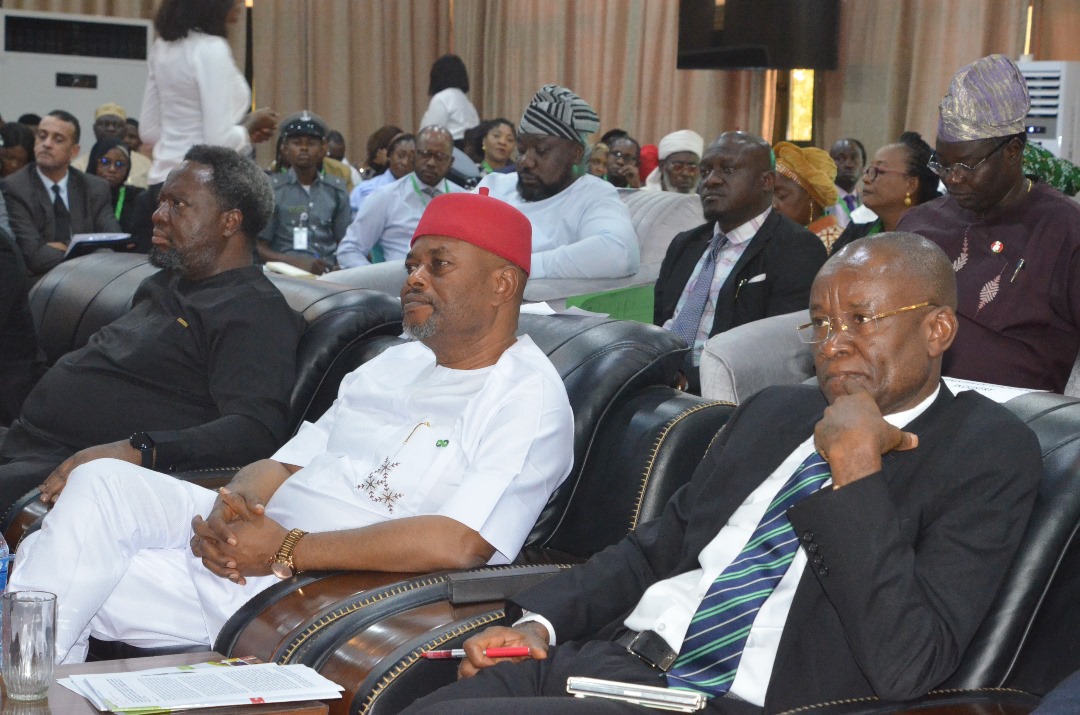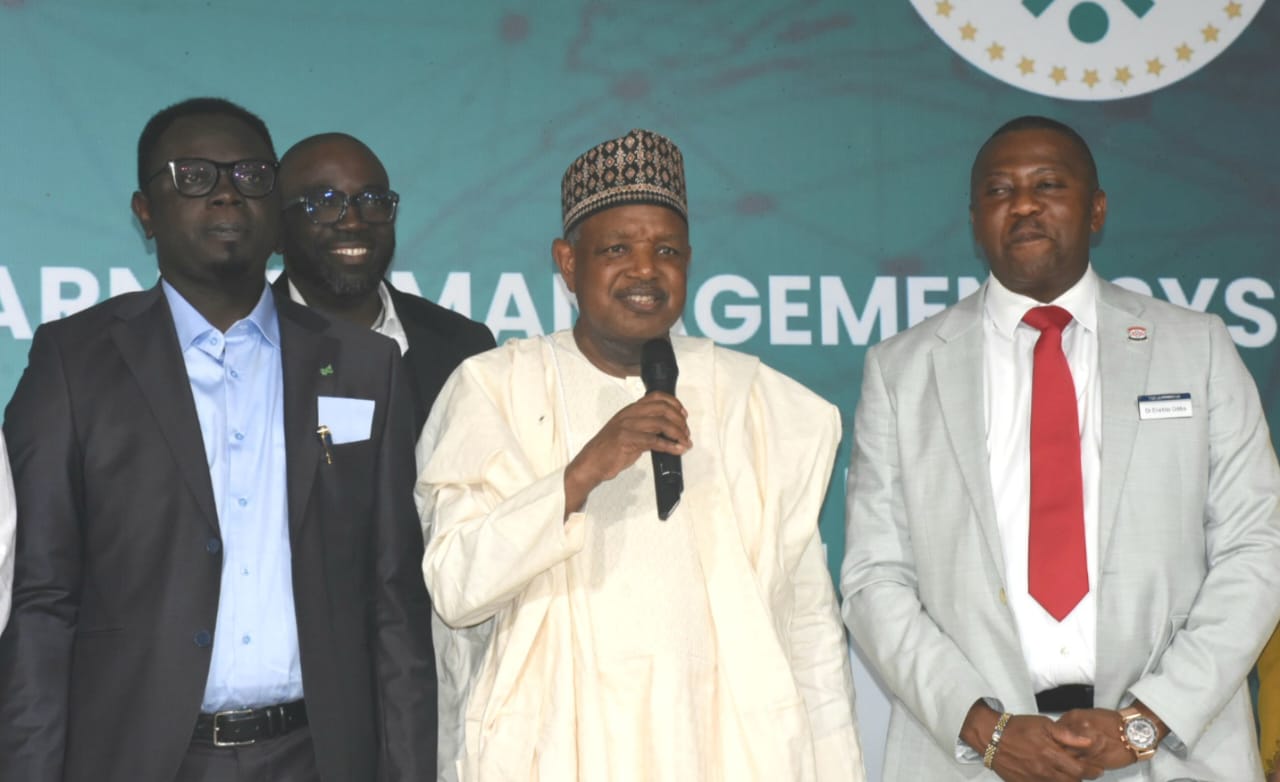Business
FG Launches Raw Materials Information Management System and RMe-regP to Drive Economic Growth and Prosperity

By Joel Ajayi
The Federal Government on Tuesday launched the Raw Materials Information Management System (RMMIS) and the Raw Materials e-Registration Portal (RMe-regP), a platform aimed at attracting both local and foreign investors, potentially leading to an investment of about $30 billion over the next decade.
Speaking at the official unveiling of platforms in Abuja, the Minister of Innovation, Science, and Technology, Uche Nnaji, emphasized that the initiative will build a data-driven economy, where local resources fuel industrialization, innovation thrives, and sustainability forms the foundation of Nigeria’s economic prosperity.
According to the Minister, this platform will provide manufacturers with reliable data for local sourcing, reduce reliance on imports, and boost domestic production. It will also attract investors, potentially bringing in $30 billion in investments over the next decade through efficient resource management. Finally, it will strengthen research and development, helping scientists and industrialists explore new product innovations and optimize material use.
“Policymakers will gain access to empirical data to create targeted policies that promote resource efficiency and sustainable extraction. If properly aligned with national industrial policies, this initiative could increase semi-processed mineral exports to $9 billion by 2030,” the Minister said.
“With accurate data, the agriculture, mining, and manufacturing sectors can maximize raw material use, fostering job creation and boosting investments by $20 billion in the next decade. This will conserve foreign exchange reserves, potentially saving $10 billion annually while strengthening the naira.”
He added, “Today, we do not just launch a digital tool; we usher in an era of transparency, efficiency, and resource-driven industrial growth. Together, we will build a data-driven economy where local resources fuel industrialization, innovation flourishes, and sustainability becomes the foundation of Nigeria’s economic prosperity.”
In his keynote address, the Nigerian Minister of State for Trade and Investment, John Enoh, stated that his ministry would provide all necessary support to the Raw Materials Research and Development Council (RMRDC) to achieve a 30% value addition for improved economic growth. He also highlighted that Nigeria is losing substantial amounts of money due to the underdevelopment of the raw materials sector.
Earlier, the Director General of RMRDC, Martin Ike-Muonso, explained that the RMMIS is an innovation developed by the RMRDC with support from key stakeholders. He described it as a user-friendly portal for managing raw materials data.
“This innovation aims to serve as a key resource for investors, manufacturers, researchers, and policymakers by providing advanced tools that support research and development. It is a robust, technology-driven platform designed to enhance data-driven decision-making, facilitate research and development, optimize resource allocation, drive industry development, support policy and regulatory frameworks, and strengthen monitoring and evaluation mechanisms.”
The RMMIS covers critical and strategic raw materials, including agricultural products, solid minerals, and secondary raw materials.
“The RMMIS is a strategic tool that will enhance the outcomes of the Made in Addition of the Africa Raw Materials Summit, which will be hosted by the RMRDC from May 20 to 22, 2025. It will provide accurate and reliable data, foster collaboration and networking, and enable informed decisions.
“By leveraging this system, the summit can achieve more effective planning, execution, and follow-up, ultimately leading to increased impact and more sustainable outcomes in raw materials development, particularly in advancing an integrated raw materials market for Africa.”
Business
FG, Investonaire Academy Unveil National Programme to Equip 100,000 Youths with Financial Skills, Digital Wealth Tools

By Joel Ajayi
The Federal Government, in collaboration with Investonaire Academy, has unveiled a nationwide financial literacy and wealth-building programme targeting more than 100,000 young Nigerians. The initiative is designed to equip participants with practical skills in budgeting, saving, investing, asset building, and long-term financial planning, positioning them for sustainable prosperity in a rapidly evolving economy.
Launched on Tuesday in Abuja, the Honourable Minister of Youth Development, Comrade Ayodele Olawande, described financial literacy as a necessary survival tool for young people confronting today’s economic realities.
He noted that the initiative represents the foundation of a broader vision expected to extend beyond Nigeria to other African nations and global markets.
Reaffirming the Federal Government’s commitment to supporting over 4,000 corps members annually, the Minister said the programme will provide platforms, resources, and skills needed for both job creation and employability.
“The young people who understand money — how to save, invest, build assets, and manage risk — are the ones who will lead Nigeria into prosperity,” he said.
A major highlight of the launch was the expansion of the Nigeria Youth Academy, a digital platform offering mentorship, training, and startup support. According to the Minister, more than 200 startups will receive empowerment through the Academy’s e-app platform before the end of the year.
He stressed the need for deeper collaboration with private organisations, innovators, and youth-focused groups, noting that government alone cannot drive youth development. He further encouraged young Nigerians to embrace skills acquisition, innovation, and digital enterprise, saying these remain critical to reducing the desire for migration and increasing self-reliance.
Outlining the Ministry’s long-term commitments, Olawande emphasized three priorities: supporting youth innovation, equipping them with growth tools, and safeguarding millions of Nigerian youths under the Ministry’s mandate.
Speaking at the launch, Sebastien Sicre, Chief Operating Officer of Investonaire Academy, said the programme was crafted to revolutionize the way Nigerian youths learn and apply financial knowledge. He highlighted the Academy’s gamified Learning Management System (LMS), which offers interactive learning tools, community forums, and real-time mentorship to make financial education engaging and accessible.
Complementing the digital platform is a new 200-square-metre physical training centre in Abuja, opposite the NNPC Towers, where in-person workshops and mentorship sessions will take place.
The curriculum covers key global asset classes — including equities, commodities, forex, and indices — ensuring participants gain a broad understanding of financial markets.
Sicre added that with Federal Government backing, the programme seeks to unlock new opportunities, strengthen youth participation in the digital economy, and reward outstanding participants through a $1 million funding pool to support new and existing ventures.
International Programme Director of Investonaire Academy, Dr. Enefola Odiba, explained that the initiative aims to bridge long-standing gaps in financial education among Nigerian youths. While schools teach many subjects, he said, essential financial skills are often missing.
“Many people can earn money — earning money can be easy. The real challenge is retaining, managing, and growing that money,” he noted.
Referencing the Central Bank of Nigeria’s definition of financial literacy, Odiba stated that implementation remains a major national challenge. He said the initiative brings together government agencies, youth groups, academic institutions, and private-sector partners to translate strategy into measurable impact.
The programme’s curriculum covers budgeting, saving, investing, and financial planning — areas where many young people struggle. By offering practical training, real-world insights, and guided mentorship, the initiative aims to build a generation of financially empowered youth capable of driving innovation, entrepreneurship, and sustainable economic growth.
With this partnership, the Federal Government and Investonaire Academy share a common goal: to empower young Nigerians with the financial intelligence and digital tools needed to build wealth, grow businesses, and transform the nation’s economic future.
-

 Featured6 years ago
Featured6 years agoLampard Names New Chelsea Manager
-

 Featured6 years ago
Featured6 years agoFG To Extends Lockdown In FCT, Lagos Ogun states For 7days
-

 Featured6 years ago
Featured6 years agoChildren Custody: Court Adjourns Mike Ezuruonye, Wife’s Case To April 7
-

 Featured6 years ago
Featured6 years agoNYSC Dismisses Report Of DG’s Plan To Islamize Benue Orientation Camp
-

 Featured4 years ago
Featured4 years agoTransfer Saga: How Mikel Obi Refused to compensate me After I Linked Him Worth $4m Deal In Kuwait SC – Okafor
-
Sports3 years ago
TINUBU LAMBAST DELE MOMODU
-

 News11 months ago
News11 months agoZulu to Super Eagles B team, President Tinubu is happy with you
-
Featured6 years ago
Board urges FG to establish one-stop rehabilitation centres in 6 geopolitical zones
